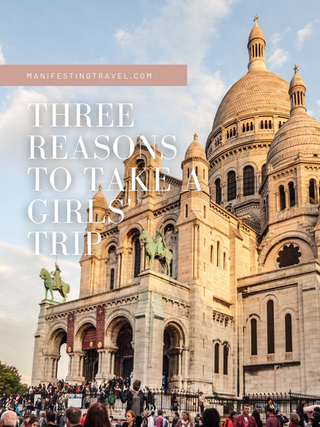
Let’s get real about one thing…in the past couple of years, we’ve spent an inordinate amount of time in front of the TV. How many times have you been asked “are you still watching?” only to peel yourself away from the indentation on your couch, grab the remote, and press the “yep, I’m still here and not going anywhere anytime soon” button? I’ll answer that for you: more times than we’d like to admit.
But if the last few years have crowned a champion outside the medical field, it would be Netflix (and yes, I'm saying that despite the fact that they're losing subscribers). They’ve made us laugh, they’ve made us cry, they’ve grossed us out…they’ve made us wonder how much we really know about our next-door neighbors. In other words, we are hopelessly devoted to them. And they're about to change the way we travel.
For as long as anyone can remember, TV has dictated pop culture trends. My own flame for travel (and quite possibly red trench coats) was fanned by my constant attempts to figure out “Where on Earth is Carmen Sandiego” every Saturday morning in the 90s. Today, it’s Netflix that is influencing the next wave of tourism trends, and the mandated armchair travelers of late are all too happy to be leading the way.

Design Travel
What to watch on Netflix:
The World's Most Amazing Vacation Rentals
Stay Here
HOME (cheating here-this one's on Apple TV)
People with discerning tastes have always sought out aesthetically pleasing accommodations, but it’s more than just whether or not something looks good these days, it has to feel good. Architecture represents history, culture, values, quality of life and thanks to Netflix shows like “The World’s Most Amazing Vacation Rentals,” “Stay Here” and “HOME” (switch to Apple TV for that one), design is being taken to the next level. Global travelers are now seeing possibilities far beyond booking bland, cookie cutter accommodations while they’re abroad. Here’s looking at you cheap hotel carpet and Cold War-era apartment buildings. Staying in places that could literally be anywhere else in the world only robs you from the authenticity of that locale.
Thoughtful and intentional interior design amplifies your travel experience. Period. Don’t believe me? Take a look at AZULIK in Tulum, where architects have created a whimsical sensory experience at the intersection of nature and spatial artistry. Their seaside villas have not only been designed to provide the utmost relaxation but to also stir your creativity, playfulness and wonder. Built at the edge of the Mayan jungle and the seafoam and sapphire Caribbean Sea, the results are nothing short of magic. But that’s just one example. Is there a more quintessential experience than renting a houseboat in a city like Amsterdam, a Riad carefully adorned like a jewel box in Morocco, an open-air room in a bamboo resort in the Balinese jungle? The answer is no.

Dark Travel
What to watch on Netflix:
Dark Tourist
Crime Scene: The Vanishing at the Cecil Hotel
I Am A Killer
Unsolved Mysteries
We’ve all laughed at the memes about the serial killer and true crime documentaries, but real talk, they’re sparking interests in an obscure travel trend. Dark travel has been quietly gaining steam for a while now, but most people associate it with Halloween because of its perceived morbidity. Where there is crime or tragedy, you can bet there is an alleged haunting that follows. Travelers have long sought out cities like Salem or the most haunted city in America, New Orleans, in hopes of brushing up against the supernatural. Haunted hotels like the Lizzie Borden Bed & Breakfast, where a family was found brutally hacked to death, or the grand old Stanley Hotel in Estes Park, Colorado where Stephen King wrote “The Shining” are both popular dark destinations. But even “darker” still is the funeral tourism in places like Indonesia.
In 2017, American author and mortician Caitlin Doughty published a fascinating book called “From Here to Eternity: Traveling the World to Find the Good Death.” The book recounts her experiences witnessing how cultures all over the world care for their dead, including the Torajan people in Indonesia, who welcome hundreds of tourists to join them at family funerals. Large funerals are seen as bringing honor to the deceased and can often have thousands of attendees with vendors, a DJ and ritualistic livestock slaughters. Netflix’s show “Dark Tourist” also visited the region to witness the ancient Ma'nene festival. Every August, Torajan families unearth their dead so the bodies can be lovingly cleaned, groomed, and honored again. Your first instinct may be to Google this, and I recommend you do so, but before you view the shocking images through a western lens, take a moment to realize that just because this may seem grotesque to the mainstream, the rituals are cultural celebrations of love, honor and remembrance.
This spike in dark tourism may be an indicator that we’re starting to challenge our preconceived notions of death. And anything that forces us to reflect and evaluate our internal thought processes is positive.

Spiritual Travel
What to watch on Netflix:
Surviving Death
Down to Earth
Ram Dass, Going Home
Wellness travel has become more and more popular over the years as people have noticed they need to take better care of themselves. But spiritual travel is poised to become a booming industry because Netflix shows like “Down to Earth, “Surviving Death” and “Ram Dass, Going Home” have lifted the veil on the ancient world of metaphysics and spirituality. There’s an entire shift in consciousness that’s taking place around the world. As a society, we’re seeing that if we want to cultivate a feeling of wholeness (not just wellness), we must consider the mind, body and spirit. We are attuning to our own energy, our higher selves and imbalances that cannot necessarily be realigned through traditional means. We are looking for the keys that unlock the secrets to our greatest potential and how we are all connected in the universe.
People have been trekking into the South and Central American jungles to drink Ayahuasca with shamans for hundreds of years, they just didn’t tell anyone about it. But times, they are a changin'. Now you hear folks talk about vibes and spiritual downloads, having their chakras balanced or going for a reiki session and buying crystals. It’s easier than it’s ever been to find these experiences while you travel. You can participate in nocturnal meditations and soul rebirth ceremonies in Ubud, have smoke baths to cleanse your energy in Peru like Zac Efron in “Down to Earth,” or visit the Vortex in Sedona. All of this is in an effort to gain more insight into ourselves and gather the collective wisdom of the planet and cosmos to see if there’s any truth to it all. And maybe there isn’t, but what if there is?

Foodie Travel
What to watch on Netflix:
Chef’s Table
Somebody Feed Phil
Salt, Fat, Acid, Heat
Seaspiracy
What the Health
For better or worse, we cooked a lot in the last year. In fact, Google searches for banana bread recipes went through the roof. And while there hasn’t been any word on the street about demand for banana bread tours, interest in culinary travel will grow because people now want to know where their food is coming from. And thanks to all the enlightening, and sometimes equally cringe-worthy shows on Netflix like “Seaspiracy” and “What the Health,” people are demanding more transparency and accountability from commercial fishing and farming industries than ever before.
But don’t underestimate the romantic lure of food either. Look at this example, a teeny-tiny portion of all the world’s swine is 100%, purebred Spanish Iberian pigs. Jamon de bellota, is one of the most revered foods in the world because of the strict traditions and regulations surrounding the small industry. The pigs, who are descendants of wild boars, get their flavor from the thousands of hilly acres they roam. Dotted with oak, cork and olive groves, the grazing lands, or dehesas, are filled with different grasses, acorns, herbs and wild mushrooms, giving the pigs an earthy and unctuous flavor profile. They are cured with salt and the dry Spanish breeze. Now compare that with the industrial pig farms where the animals stand shoulder to shoulder in their own muck, eating a combination of who knows what from who knows where. It’s not hard to see that there can be passion and poetry in food if we start looking for the people behind it. When you cut out the individuals you cut out the ethics and the essence.
But it’s not just food. In the sprawling fields of Oaxaca, Mexico, the locals have been harvesting agave and making their signature Mezcals virtually the same way for the last 200 years. In Italy, traditional Tuscan wineries and olive oil makers are adopting biodynamic techniques and scheduling their agricultural processes around the passage of the sun and moon through the constellations. Shows like “Chef’s Table” and “Somebody Feed Phil” remind us that the heart and soul of food and wine/ spirits should be brought back to the forefront, and people will now search the globe to have those meaningful encounters.
Want more Travel Talk?

Ashley Oñoz-Wright has been a travel writer and editor based in Las Vegas, NV for the last eight years and is a regular contributor for Manifesting Travel, Modern Luxury, Sophisticated Living, Greenspun Media Group, Vegas.com and LasVegas.com. She holds a degree in Sociology & Anthropology from DePauw University.






